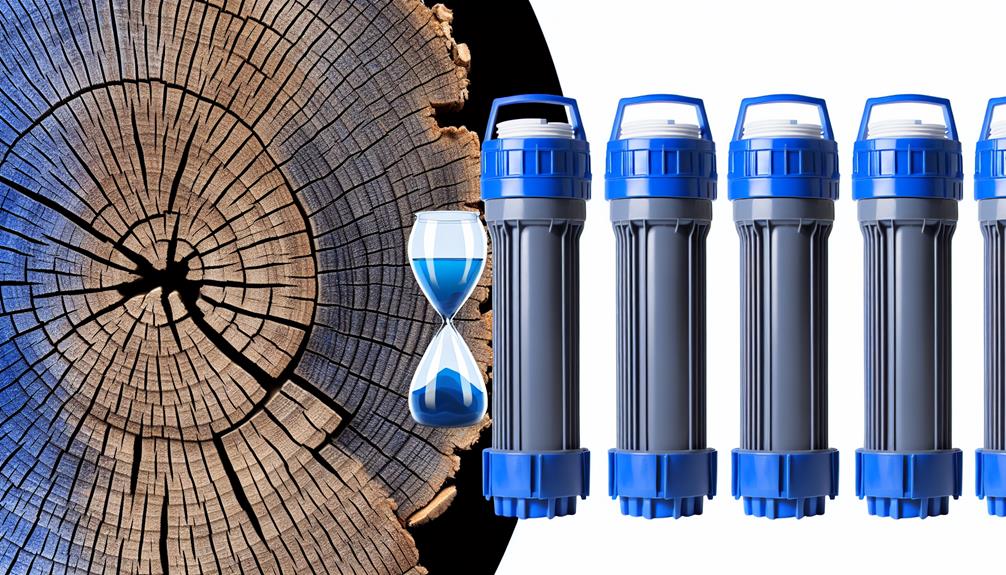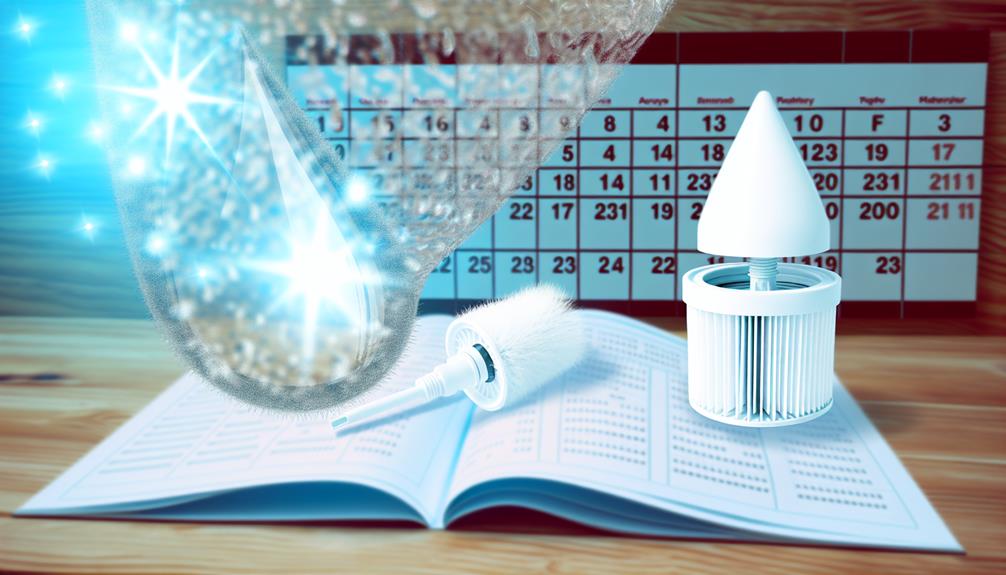Your water filter is the unsung hero in your home, silently safeguarding your health with every glass of water you drink. It's easy to forget about this vital piece of your daily life, but just like any other workhorse, it can't run forever without a bit of TLC.
You've probably got a gut feeling that it's time for a change when your water starts to taste like a swimming pool or trickles out slower than molasses in winter. These are just a few of the red flags waving at you, indicating it's time to swap out that old filter.
But there's more to it than taste and flow—other, less obvious signs are lurking in the shadows. Stick with me, and you'll uncover the eight definitive indicators that your faithful filter is due for retirement, ensuring that you continue to enjoy the pure, refreshing water you've come to expect.
Unusual Taste or Smell
If you're noticing a metallic taste or a rotten egg-like smell in your water, it's likely time to replace your water filter. These sensory changes are critical indicators that the filter isn't working as intended.
When the quality of water diminishes, it's often evidenced by an unusual taste or smell. A metallic taste can denote the presence of excess minerals or the infiltration of pipe material, while a salty taste might suggest a high concentration of sodium ions in your drinking water.
The presence of a rotten egg-like odor typically points to hydrogen sulfide gas, which isn't effectively removed when a filter reaches the end of its functional life. Replacing your water filter becomes imperative to restore the purity of your water.
It's essential to recognize that water filtration systems are designed to trap contaminants, and over time, these systems can become saturated, leading to a noticeable change in the water's taste and odor.
Analyzing these symptoms with precision, you can determine that a new filter is necessary to maintain the standard of your drinking water. Act promptly upon detecting any unusual taste or smell, as it's a clear sign that the efficacy of your current water filtration system is compromised.
Slow Water Flow
While unusual taste or smell signals a compromised filter, a slowdown in water flow is another clear sign that your filter requires immediate attention. A decrease in the water flow rate isn't just an inconvenience; it's an indicator that your water filter is likely clogged with contaminants and may no longer be effectively purifying your water. When you notice a sudden reduction in water pressure or a slower water flow, it's a sign that your water filter needs replacing.
Water filters usually have a specific lifespan, and over time, they accumulate particles that can impede water flow. This slow water flow is a direct signal that the filter's capacity to cleanse is diminished, and it's time to replace the water filter. A noticeable decrease in the rate at which water flows through your filter means that changing the water filter isn't just recommended, it's necessary.
Addressing low water flow promptly ensures that you continue to enjoy clean, safe water. Don't ignore this critical sign that your water filter's efficacy has declined. Change the water filter to maintain the water flow rate and quality. Remember, slow water flow isn't just a minor annoyance—it's a clear sign that it's time to replace your water filter.
Cloudy Water Appearance
A cloudy or milky appearance in your water, often accompanied by floating particles, strongly suggests that your filter isn't effectively removing dissolved pollutants. This cloudy water appearance is one of the warning signs to watch for, indicating that it may be time to replace your water filter.
When your tap water starts to look unclear, it's not just an aesthetic issue; it can also be a sign of a deeper problem with your water treatment system, particularly if you're dealing with hard water.
Consider these key points that signal the need for replacing your water filter:
- Reduced clarity and the presence of suspended particles
- An increase in mineral deposits, indicative of hard water issues
- A drop in water pressure, suggesting a clogged filter
- Unpleasant taste or odor, pointing to contaminants bypassing the filter
- Visible signs of sediment buildup in the filter cartridge
An analytical assessment of these elements will guide you in making an informed decision about changing your water filter.
Don't overlook these symptoms; they're critical for maintaining the quality and safety of your drinking water. Remember, proactive water filter maintenance is essential to ensure that your water remains clean, clear, and healthy for consumption.
Frequent Filter Clogs
Regular maintenance is crucial, as frequent filter clogs can significantly reduce your water filter's efficiency and compromise the quality of your water. When you notice a decrease in water flow rate, it's a clear sign that your filter is becoming clogged. A clogged filter struggles to perform its job, and this is a key indicator that there's a need to replace it. If left completely clogged, the filter can become a breeding ground for contaminants like black mold, which you certainly don't want in your drinking water.
Pay attention to your filter's indicator light—if it's showing yellow or red, it's alerting you to the amount of water used and the diminishing capacity of your filter. An unpleasant odor or a metallic taste in your water are symptoms that your filter isn't catching minerals and impurities effectively.
To ensure you're replacing the water filter appropriately, consult your manual to see how long do water filters really last. Make sure you're not just guessing when it's time to change it. An analytical approach to filter maintenance isn't only precise but also ensures the longevity of your water filtration system and the health of your water.
Expiration of Filter Lifespan
Understanding when your water filter has reached the end of its lifespan is essential for maintaining the purity of your drinking water. Water filters, like any other product, expire after a certain period or after filtering a specific number of gallons of water. While you might use water softeners to handle hard minerals, your water filter still needs to be in top condition to ensure a healthy water supply.
To tell when your water filter might need replacing, consider these indicators:
- The indicator light on the device turns on (green, yellow, or red), signaling water usage and filter status.
- A metallic taste in the water suggests mineral deposition due to an aged filter.
- An unpleasant odor, such as that of rotten eggs, indicates that filtration is no longer effective.
- A noticeable decrease in water pressure can point to clogged filter connections.
- The presence of black mold in your filtered water is a sign of fungal growth and compromises water safety.
Different filters available have varying lifespans, and it's crucial to know which type you have to ensure it's working correctly. Regularly check your filter against these factors to maintain a reliable and uncontaminated water supply.

